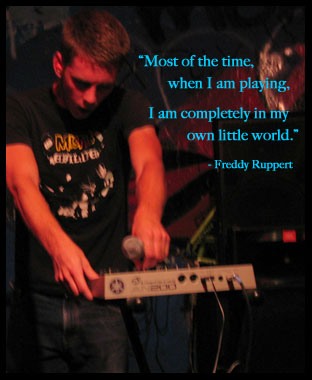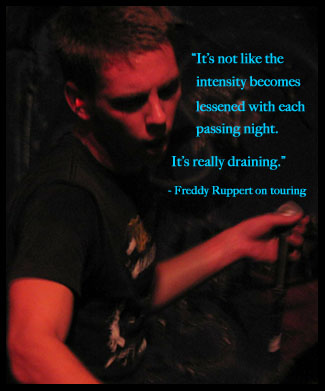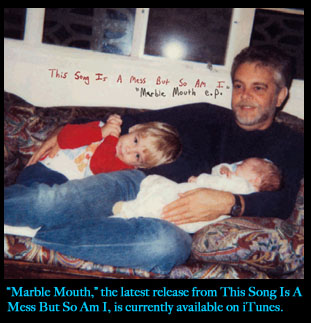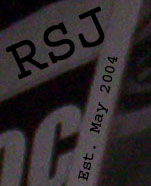Noise and synthpop act This Song Is A Mess But So Am I came onto the scene after the creation of debut album, "Church Point,
LA." This release dealt with the passing of the mother of sole band member Freddy Ruppert, after a battle with cancer. Following
the album's creation, Freddy embarked on a series of shows, playing with acts such as Babyland and Midnight Laser Beam and traveling with artists Xiu Xiu and BARR.
During performances, Freddy is a whirlwind of emotional and physical energy, visually conveying the raw and brutally personal
content of his songs. His movement is difficult to capture on camera because of its sheer speed and involves a lot of moving
of limbs, head shaking and screaming into a microphone -- when that microphone isn't being battered against the ground. With
a new EP just released on Acuarela Discos and a tour slated to begin in July, Freddy was able to make some time in his busy college schedule to answer our questions.
By: Geoffrey Smith II
Rock Star Journalism: Your first album focused around the passing of your mother. Was its creation a cathartic process for
you?
Freddy Ruppert: The creation of the first album was very cathartic, and that was basically the reason why This Song Is A Mess
But So Am I [TSIAM] was originally started. It was a way to deal with what was going on with my mother's battle with cancer
and her death. After the album was completed, though, the project started to become less cathartic. Having to then play
those songs in public, while being cathartic and an emotionally exhausting experience each time, also continued to reopen
wounds and I felt like I was stuck to just wallow in it.
RSJ: With your older tracks "reopening old wounds" when you performed them, did this motivate you to create new material with
different subject matter?
FR: Not really. Sometimes you feel like you have come to peace with certain things and then you let them pass, and that is
what happened.
RSJ: Before this difficult event, what was your musical experience?
FR: Before TSIAM, I was in a project with my friend Josh, called Masque Opera. It was my first venture into electronic music.
In high school I was in a couple of bands, including a goth band, a hardcore band and a crust punk band.
RSJ: Is there any info for Masque Opera online, and is your friend still continuing the project?
FR: There use to be a web page, but it's gone now. The project broke up because Josh moved to San Francisco to go to art
school. He has since moved back to L.A. He is currently creating amazing noises in the projects Ex Jesus and Moth Drakula.
RSJ: Where do you see the lyrical content of your music heading?
FR: I'm not quite sure, to be honest. Lyrics are a really weird thing for me. I don't like writing them, and it's really
hard for me to write them, even though most of my lyrics are really plain and simple. I have a handful of songs where the
music is completely done, but I have nothing to match with them lyrically yet. So, the songs just sit on my hard drive forever.
 RSJ: You're currently in college, studying Theology. Is this influencing your music?
FR: Yes, it definitely is. One of the newest songs titled "Dietrich" is about Dietrich Bonhoeffer, a Christian martyr and
protestant theologian in Nazi Germany. He was arrested after it was discovered that he was helping Jews escape Germany; he
also was a part of the group that planned an assassination attempt on Hitler.
RSJ: What's the creative process for a TSIAM song?
FR: Most of my songs are composed on the computer, and then I will add in elements from hardware synths, groove boxes, samples
and so on. But most of it takes place on the computer, so I am kind of writing and recording at the same time. I don't really
write lyrics together with a song. I write them separate, and then I match them up with a song later, depending on if the
moods fit. A lot of the creative process of the song depends on happy accidents.
RSJ: For a simply dressed man with a couple pieces of hardware and a microphone, your shows are very visual because of how
you move onstage. Is this something you do consciously?
FR: No -- most of the time, when I am playing, I am completely in my own little world. During the songs I am completely isolated
from what else is going on around me. This sometimes becomes a problem because I am not aware of my surroundings spatially.
RSJ: How do people react to your music at shows?
FR: To be honest, I don't really notice. My friend David likes to take pictures of people with their fingers in their ears.
This happens a lot of the time.
RSJ: Where can we check out David's photography?
FR: Go to http://www.seemonkeyphotography.com
RSJ: Are there folks who "don't get" what you're doing and criticize your music for sounding unpolished?
FR: Surprisingly, so far I haven't really noticed anyone criticizing my music for sounding unpolished. I'm sure it's only
a matter of time. I feel like I have received a lot of bullshit, though, from people who don't understand where my music
has come from as far as its influences go.
RSJ: Who are the influences in your current music?
FR: This is hard to say right now, because I sold my record and CD collection except for material from friends' bands and
a few artists whom I can't live without. I'm hoping it will have a weird effect on my music in a way -- if I want to listen
to music I will have to create it. I'm sure this was a totally stupid idea, though, because in a matter of minutes I will
say, "Man, I feel like listening to some Big Black. Fuck -- I sold that! What the fuck?"
 RSJ: Have you interacted with fans that empathize with the experiences you sing about?
FR: Yes, it's been kind of amazing actually. I've met and have heard from many people who have also lost someone they
love due to cancer or someone they love is currently battling cancer. It's been really amazing to have that kind of connection
with someone and be able to talk to them about how they are dealing with it and to just share similar experiences, fears and
pains. And while it's sad, it also gives me a lot of strength and courage to able to share that with someone and to know
you are not alone in anything.
RSJ: You seem to release so much emotion during your shows. How does this affect you on tours?
FR: It can be pretty brutal, especially on longer tours. It's really exhausting because it's not like it becomes a routine
or the intensity becomes lessened with each passing night. I never get used to it. It's really draining.
RSJ: How were your experiences touring with Xiu Xiu and BARR?
FR: Touring with both projects was amazing. I highly respect both bands, and I think besides making amazing music, they
also are both doing something that is extremely important. They are also all very good friends, so to be on tour with them
is always a fun time. They both have taught me a lot.
RSJ: Do you think the teaching process with BARR and Xiu Xiu was two-way -- like, maybe you taught them something in the
process as well?
FR: Yeah, I think so. I'm pretty sure I taught them how to piss off the sound dude. I'm pretty good at that.
RSJ: How did you get involved with Babyland and their label, Mattress Records?
FR: Babyland is one of my favorite bands, and they are a band that has both highly influenced and inspired my own project.
I met them when I was doing Masque Opera with Josh. We were both really into Babyland, and we were making electronic music,
so one day at one of their shows I just approached them about setting up a show together, and they were into it. After that,
they asked us to open for them a bunch and from there I just became good friends with them.
After Masque Opera broke up, and I continued with TSIAM, they offered to put my [first] CD out. I was honored because
here was this band that I completely look up to, and they want to put out my CD? Working with them was amazing.
RSJ: The new EP, "Marble Mouth," feels like part of a progression that includes your first album. Will the
third album be part of this, too?
FR: You are right, "Marble Mouth" is a kind of an extension from the first album. It does not really deal with
my mother's death directly anymore, but instead its main theme deals with changing family dynamics since then. There are also
a few songs that are not on that wavelength at all. I think the next full-length release will no longer be a progression
of these themes.
 RSJ: KMFDM is a band that has a continuing theme with the cover art they use in their releases. Both TSIAM releases have
had some very candid family photographs as their art. Is this something that's going to continue? What's the story behind
the pictures for "Marble Mouth?"
FR: I really like it when bands use similar artwork for their albums. I think it's really awesome when a band has a distinct
vision of what they are trying to accomplish. It's really rad that you can see a cover and be like, "That's a Smiths
cover," or "That's a KMFDM cover" or "That's a Swans cover." You just know because they have a distinct
vision of how they want to present their art. That is why both of my releases have used similar pictures and styles -- Dan
Gatto of Babyland did both layouts -- to try to keep that distinct vision. It is something that I definitely want to continue.
On "Marble Mouth," the cover is of my father, my brother and me. I felt that since the EP was a continuation
of similar themes focusing on changing family dynamics, the picture was perfect. The back cover is of my brother and me.
When I saw the photos I felt that they were just right and perfectly explained everything I wanted [to convey].
RSJ: When can we expect your next album?
FR: I'm working on it right now, but it's coming along very slowly. School weighs me down a lot, and the time I get to
work on music is very limited. I was hoping to release a full-length at the end of this year, but I don't think that seems
so likely anymore. I just finished the school semester though, so who knows? I also have no idea who will release it. I
mean, it could still happen by the end of this year, but it may not be until early first quarter of next year. I'm shooting
to have the entire recording process done by this fall.
RSJ: What's going on with your upcoming tour? Who'll be part of it?
FR: A full U.S. tour is being booked for July through August. I'm excited about it. I will be playing in places I have
not played before and places I have not been to in awhile. I'm not touring with any other bands in particular, just meeting
up with some rad bands in their respective cities.
RSJ: Can you tell us some of the bands you'll be meeting up with, or is it too soon to say?
FR: It's too soon to say. I've got my fingers crossed for Marilyn Manson, though.
RSJ: What aspirations do you have for your act?
FR: The only thing I care to do with it is to keep searching and creating. That's all.
Got something to say about this feature? E-mail us.
|

